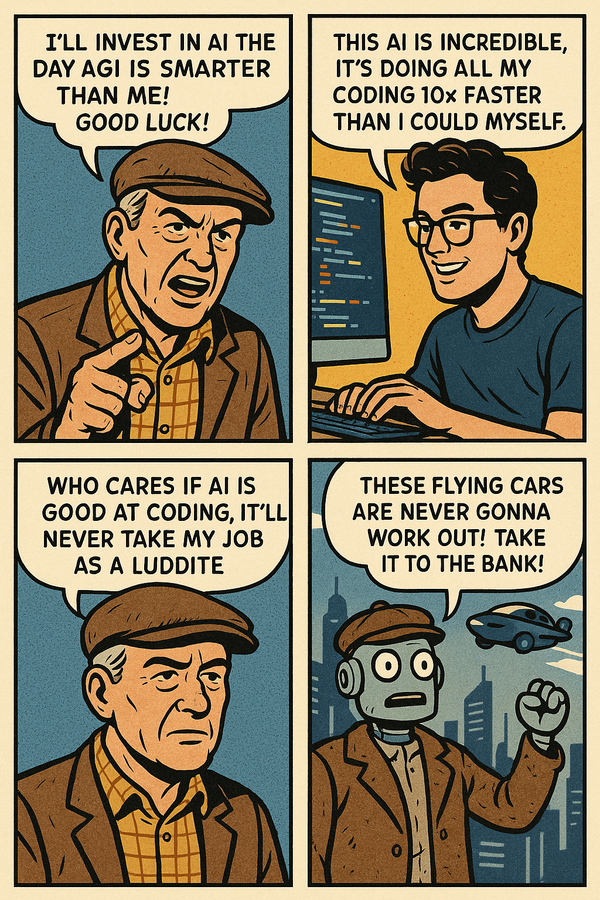The AI Revolution Ain't Nothing Compared To The Robotics Revolution
And it won't take eight or nine years for The AI Revolution to enable the new form factors (robots, most importantly, the humanoid robot form factors) that will change our world and society writ large forever.

A couple of weeks ago, I had an epiphany.
The AI Revolution is actually all about The Robotics Revolution.
Let me explain but first, let me remind you all to be sure to join us for today's AI Revolution webcast at 5pm ET on YouTube, Twitter, or Facebook. Please Follow us on our LinkedIn Page and Connect and Follow Cody here.
Remember when the Internet Revolution hit in the late 1990s and by the year 2000, any company with a dot com in their name was worth tens of billions of dollars? A lot of folks remember Pets.com and Webvan bubbling and then crashing, but few people remember when K-Tel, the company that made the infomercials peddling album compilations of bad music that Gen Xers grew up watching, became K-Tel.com and the stock went from $2 to $60.
Two years later, the stock was at 11 cents on its way to zero.

The reason those stocks bubbled like they did was because most everybody could see that the Internet was going to Revolutionize how the world bought, sold, communicated, worked, lived, etc. They weren't wrong! Today, people buy their pet food from Chewy.com, households get their groceries delivered from the local grocery store by Instacart and listen to music on Spotify. Getting a "dot com" URL wasn't hard, in fact that was the most commoditized part of the process of building...
a great online business. More to the point, it wasn't until The Internet Revolution (and The Semiconductor Revolution) had matured enough for a new form factor, ie The Smartphone Revolution, to accelerate the global economy and enable the Internet companies to create trillions of dollars of economic value for investors.
Said another way, it took about eight years for The Internet Revolution to beget the Smartphone Revolution which created trillions of dollars of Revolutionary wealth.
I think there's a clear analogy to be made here with how The AI Revolution is about to beget The Robotics Revolution which will create tens of trillions of dollars of wealth. And it won't take eight or nine years for The AI Revolution to enable the new form factors (robots, most importantly, the humanoid robot form factors) that will change our world and society writ large forever.
If dot com ownership was almost completely commoditized because anybody could buy a dot com on Network Solutions, the large language models (LLMs) that today constitute what most people consider to be "AI" are obviously more complex and inherently more valuable than a simple ownership of a dot com was. That said, eighteen months ago when ChatGPT was released, it was just about the only mainstream, commercially available LLM out there. Fast forward to today, and there are literally dozens of ChatGPT competitors (like Gemini, Claude, Grok, Meta.ai, and Mistral) and in another two or three years, there will hundreds if not thousands of LLMs available for consumers and enterprises and governments around the world to use. The fact that Meta, Google, and even Microsoft have now open-sourced foundation LLMs that are completely free to use is proof that LLMs are being commoditized. In many cases, these open-source LLMs, like Meta's LLaMA 3 model, perform as good or better than OpenAI's most advanced model (GPT-4) on certain metrics.
So while LLMs are clearly more valuable and unique than dot coms by themselves are, the LLM is quickly being commoditized in their own right and probably, by themselves, are not going to create tens of trillions of dollars of new growth and markets for the economy and investors. And while owning a dot com was simply the first step in building a great Internet business and (eventually an app business), it was the companies that executed and built great sustainable business models on top of the dot com that they owned that created trillion-dollar economies. Likewise, having your own LLM and/or even access to other companies' LLMs is not going to ensure success, rather it will be those companies that take AI/LLMs and put them into business models that do more than just help Mastercard become more efficient with customer service and collections. Creating tens of trillions of dollars of wealth for investors will take more than just AI-enabled supply chain management and AI-enabled chatbots.
And that's really where The Robotics Revolution gets to be so crucial to The AI Revolution and to Revolution Investors. Because the companies where the biggest value-add is going to be will be those that create the robots that use the AI to do manual labor and all kinds of applications and services that are currently done by humans. Not to mention the applications and services that don't even exist yet because nobody's got the robots to create those applications and services yet. There's almost no limit to how much economic value, savings and growth can be created when we have intelligent robots doing existing and as yet nonexistent jobs for the world.
I remember writing and going on TV to talk about how the iPod would eventually become a "MiniMacBookPlus For Your Pocket" that would do more than your PC was doing for you in 2004 through 2007 (I wasn't clever enough to come up with the name iPhone which was trademarked at the time by Cisco anyway). And looking back now it was obvious that the smartphone form factor and broadband wireless internet would enable billions of people every day to do trillions of different things on the devices in their pockets. But nobody believed it would happen until 2008 when the iPhone was released and even then they doubted its Revolutionary significance.
That's pretty much how I felt last week when I was in San Francisco and mentioned the importance and potential of The Robotics Revolution and how we can all see Tesla and others creating humanoid robots that will change the world forever to a packed conference room at the MoneyShow and was met with utter skepticism. It's how I felt last week when I literally visited startup robotics companies and they scoffed at the potential size of The Robotic Revolution. Part of the reason for that doubt at the robotics startups is because I mentioned the importance of making the robots themselves in humanoid form factors, which they are not focused on.
Meanwhile, if you're paying attention, this current setup for The Robotics Revolution seems obvious. It probably won't take eight or nine years like it did for the 1990s Internet Revolution to enable The Smartphone Revolution. It's a much more tech-intense world and my Kurtzweil Rate Of Change theory states that everything in technology is always accelerating as we stand on the shoulders of giant Revolutions.
The reason that the humanoid form factor is so important is because we live in a society that has been built for human being form factors. Doorways, cars, stairs, shovels, etc are all designed for human being form factors to use. A humanoid robot with visual, audio and speech capabilities is going to be able to do most anything a custom-designed robot will be able to do, but the humanoid robots will have much more scale than any other robotic form factor. For reference, the global labor market is estimated at about $42 trillion annually (or roughly 50% of global GDP).
So, what are the best ways to invest in The Robotics Revolution? It won't surprise you that we have already been invested in the best Robotics Revolution companies -- Tesla (TSLA), Nvidia (NVDA) and Amazon (AMZN). Tesla's already heavily invested in developing the Optimus robot which is indeed a humanoid form factor. Nvidia's already heavily invested in making chips and software that power The AI Revolution (that they've almost singlehandedly enabled so far), and they also build chips and software that is now starting to enable to The Robotics Revolution. And Amazon has spent decades using robots in their distribution centers and will be able to save billions of dollars in salaries and other expenses as robots take over much of the work done presently by humans in those data centers.

Meanwhile, Bryce and I are going to study everything we can find on The Robotics Revolution. We already have a spreadsheet full of companies that are either building or supplying (or trying to build/supply) The Robotics Revolution and I plan for us to know everything about the business of robotics before the rest of world believes in it. There will be trillions of dollars of new wealth created in the AI-enable Robotics Revolution, and I plan to have our buckets nearly entirely in front of what I will believe might be the most transformative era of all time.





